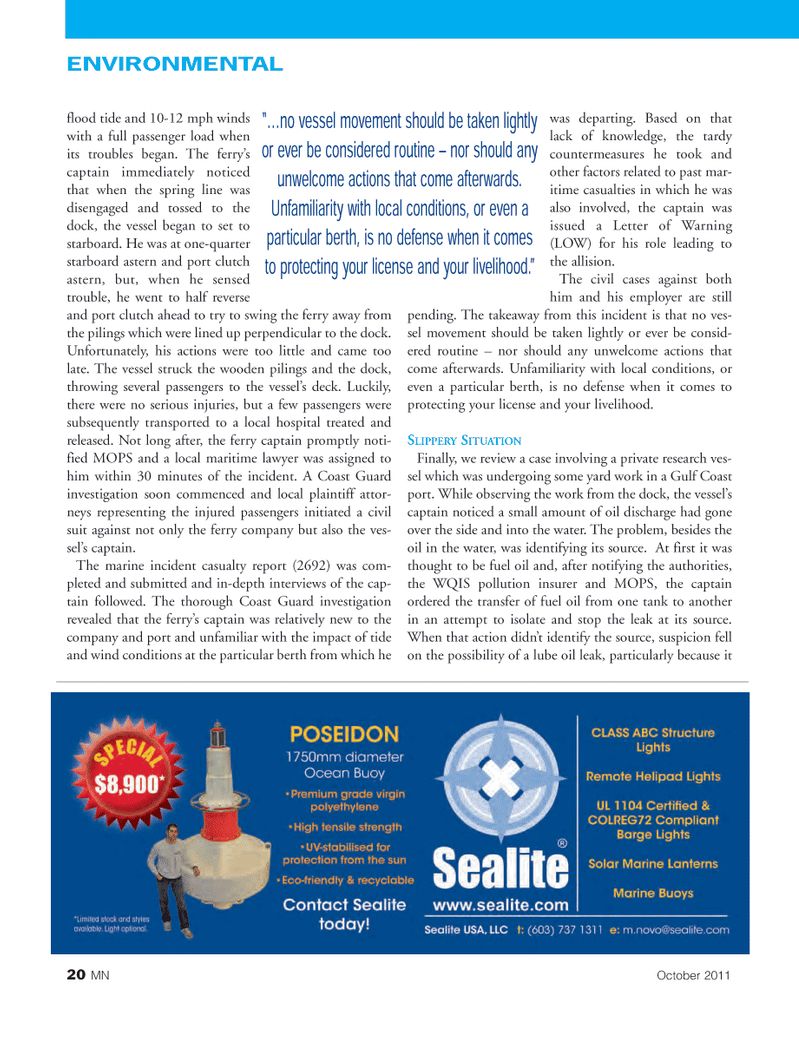
Page 20: of Marine News Magazine (October 2011)
The Yearbook
Read this page in Pdf, Flash or Html5 edition of October 2011 Marine News Magazine
20MNOctober 2011ENVIRONMENTAL flood tide and 10-12 mph windswith a full passenger load whenits troubles began. The ferry?s captain immediately noticedthat when the spring line wasdisengaged and tossed to thedock, the vessel began to set to starboard. He was at one-quarter starboard astern and port clutch astern, but, when he sensedtrouble, he went to half reverse and port clutch ahead to try to swing the ferry away from the pilings which were lined up perpendicular to the dock. Unfortunately, his actions were too little and came too late. The vessel struck the wooden pilings and the dock, throwing several passengers to the vessel?s deck. Luckily, there were no serious injuries, but a few passengers were subsequently transported to a local hospital treated and released. Not long after, the ferry captain promptly noti- fied MOPS and a local maritime lawyer was assigned to him within 30 minutes of the incident. A Coast Guard investigation soon commenced and local plaintiff attor- neys representing the injured passengers initiated a civil suit against not only the ferry company but also the ves- sel?s captain. The marine incident casualty report (2692) was com- pleted and submitted and in-depth interviews of the cap- tain followed. The thorough Coast Guard investigation revealed that the ferry?s captain was relatively new to the company and port and unfamiliar with the impact of tide and wind conditions at the particular berth from which he was departing. Based on that lack of knowledge, the tardy countermeasures he took and other factors related to past mar- itime casualties in which he wasalso involved, the captain was issued a Letter of Warning (LOW) for his role leading to the allision. The civil cases against bothhim and his employer are still pending. The takeaway from this incident is that no ves- sel movement should be taken lightly or ever be consid- ered routine ? nor should any unwelcome actions that come afterwards. Unfamiliarity with local conditions, or even a particular berth, is no defense when it comes to protecting your license and your livelihood. SLIPPERY SITUATION Finally, we review a case involving a private research ves- sel which was undergoing some yard work in a Gulf Coast port. While observing the work from the dock, the vessel?s captain noticed a small amount of oil discharge had goneover the side and into the water. The problem, besides the oil in the water, was identifying its source. At first it was thought to be fuel oil and, after notifying the authorities,the WQIS pollution insurer and MOPS, the captain ordered the transfer of fuel oil from one tank to another in an attempt to isolate and stop the leak at its source. When that action didn?t identify the source, suspicion fell on the possibility of a lube oil leak, particularly because it ??no vessel movement should be taken lightly or ever be considered routine ? nor should any unwelcome actions that come afterwards. Unfamiliarity with local conditions, or even a particular berth, is no defense when it comes to protecting your license and your livelihood.? MN#10 (18-31):MN 2011 Layouts 10/5/2011 1:47 PM Page 20

 19
19

 21
21
